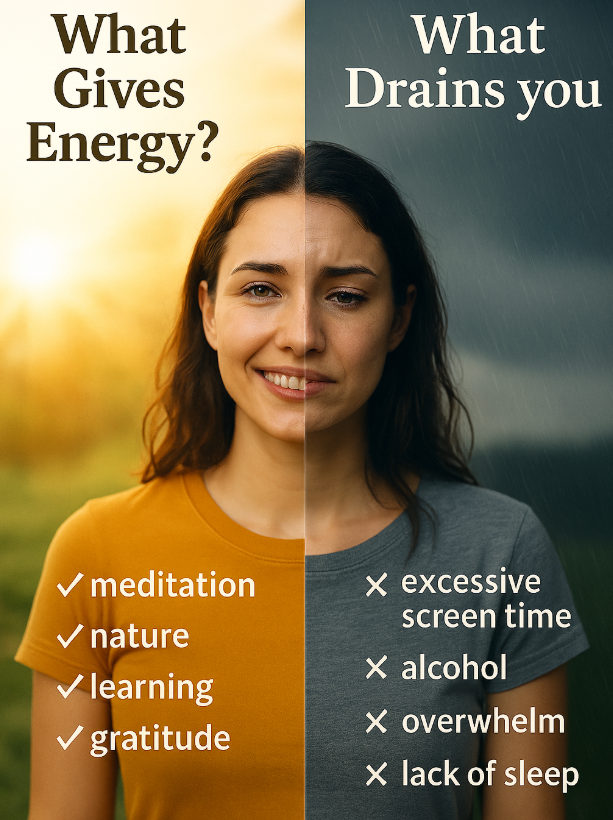What Gives You Energy and What Drains You: The Complete Guide
Discover the habits that boost your energy and the ones that drain it. Learn how to build daily routines that fuel your body, mind, and soul.
HEALTHBLOG-LIST
Narcisse Bosso
9/4/20252 min read


In Brief
Energy is more than just calories or sleep, it’s the balance between what we do, what we eat, and how we manage our thoughts and emotions. Some habits act as powerful fuel, while others quietly drain our vitality. Knowing the difference is the first step to living with more strength, clarity, and joy.
Table of Contents
What Really Shapes Your Energy Levels
What Gives Energy
Physical Habits
Mental & Emotional Practices
What Drains Energy
Lifestyle Factors
Emotional & Environmental Stressors
How to Protect and Restore Your Energy
FAQ
Conclusion
What Really Shapes Your Energy Levels
Your energy depends on multiple factors: nutrition, sleep, hormones, mental health, and environment. According to the World Health Organization, stress and poor lifestyle habits are major contributors to fatigue worldwide. On the other hand, daily healthy choices can dramatically improve your energy levels and overall health.
👉 Related: Chronic Fatigue: Causes and Treatments.
What Gives Energy
🌱 Physical Habits
Quality sleep: Rest repairs cells and balances hormones.
Nutritious food: Whole foods rich in protein, healthy fats, and fiber sustain energy.
Regular exercise: Movement boosts circulation and endorphins.
Sunlight & nature: Natural light regulates circadian rhythm and vitamin D.
🧘 Mental & Emotional Practices
Meditation and mindfulness: Reduce stress and improve focus.
Gratitude: Shown to increase happiness and resilience.
Learning and growth: Stimulates the brain and keeps motivation alive.
Positive social connections: Supportive relationships recharge your emotional battery.
What Drains Energy
🚬 Lifestyle Factors
Excessive screen time: Disrupts sleep and concentration.
Alcohol and junk food: Cause blood sugar crashes and inflammation.
Overworking: Burns physical and mental resources.
Lack of sleep: The #1 cause of chronic fatigue.
😰 Emotional & Environmental Stressors
Fear and anxiety: Trigger cortisol surges that deplete energy.
Negative self-talk: Drains mental focus and self-esteem.
Social conflicts: Stressful interactions exhaust emotional reserves.
Financial or work stress: Constant worry impacts both brain and body.
How to Protect and Restore Your Energy
Audit your habits: Identify one energy booster and one drainer in your life today.
Set boundaries: Limit screen time and overwork.
Recharge daily: Walk in nature, meditate, or practice gratitude.
Fuel wisely: Eat whole, unprocessed foods and stay hydrated.
Prioritize sleep: Aim for 7–9 hours of quality rest.
👉 Related: How I improved my sleep in 1 month
FAQ
1. What is the biggest energy drainer?
Lack of sleep and chronic stress are the top contributors to fatigue.
2. Can food really boost energy?
Yes, whole foods with protein, healthy fats, and complex carbs give sustained energy.
3. Is coffee an energy booster or drainer?
In moderation, it boosts alertness. In excess, it can cause crashes and poor sleep.
4. How do emotions affect energy?
Negative emotions like fear or resentment can drain energy, while gratitude and joy boost it.
5. What’s the fastest way to restore energy naturally?
Step outside, breathe deeply, hydrate, and take a short walk.
Conclusion
Your energy is shaped by every choice you make. The more you fill your life with energizing habits: good food, sleep, movement, gratitude, and connection, the less room you leave for draining patterns. Protect your energy daily, and you’ll feel stronger, calmer, and more resilient.
💡 Action step: This week, replace one draining habit (like doomscrolling at night) with an energizing one (like a gratitude journal). Notice how your body and mind respond.
Scientific Sources
World Health Organization (WHO). Stress and lifestyle factors in global health.
Harvard Health Publishing. The importance of sleep and circadian rhythm.
Fredrickson BL. The role of positive emotions in well-being. Am Psychol. 2001.
Written by Narcisse Bosso, certified naturopath. His lifelong passion for health became a profound calling after a loved one passed away from a natural illness that could have been prevented with simple lifestyle changes and habits.
